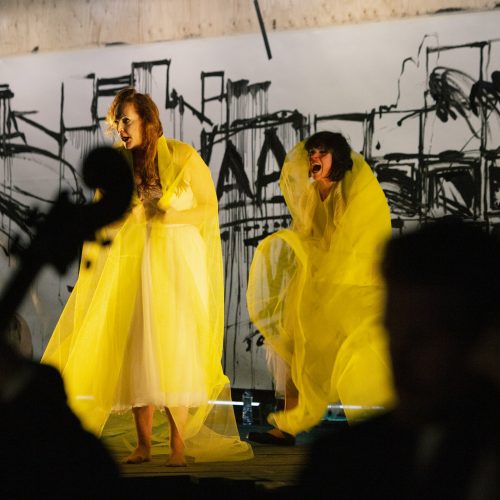
The Merchant of Venice
Toneelgroep Amsterdam (has been renamed to ITA, International Theatre Amsterdam)
January 6, 2002 - April 27, 2003
2 hours
Tour in The Netherlands and Belgium. Main stage.
In The Merchant of Venice Shakspeare love and money is connected strongly, where love is a lottery, an illusion to not face reality and turns into a fairy tale. Money is the motor. Dominated by the merchant of Venice, Antonio. The outsider Shylock is his enemy. When Antonio needs money for his best friend Bassanio he has no other solution than asking his reval Shylock for it. Shylock suggests the game: If he doesn’t get the money back in time he wants one pound of meat out of the body of Antonio. What seems to be a joke becomes deadly truth. Shylock goes to court demanding his right as it is written in the contract with Antonio: One pound out of the body of Antonio.
Everything for sale
Director
Ola Mafaalani
Author
William Shakespeare
Dramatug
Dirkje Houtman
Set design
Jan Versweyveld
Music
Jan Kooper
Sound design
Peter Zwart
Kostumes
Lieve Pynoo
Shylock
Wim Willaert
Portia
Adelheid Roosen
Lancelot Gobbo
Fred Goessens
Antonio
Hajo Bruins
Lorenzo
Alwin Pulinckx
Gratiano
Jorre Vandenbussche
Bassanio
Titus Muizelaar
Prins van Marokko
Leon Voorberg

Photo: Chris Van der Burght
The quality of mercy is not strained.
It droppeth as the gentle rain from heaven
Upon the place beneath.
It is enthronèd in the hearts of the man.
When mercy seasons justice.
William Shakespeare
(Portia IV.i.179–197)
Genade heeft niets uit te staan met dwang.
Zij daalt als zachte regen uit de hemel
Neer op de korst der aarde. Dubbel is
haar zegen: wie haar schenkt en wie haar krijgt
Die zegent zij.

Photo: Chris Van der Burght
What if my house be troubled with a rat,
And I be pleased to give ten thousand ducats
To have it baned? What, are you answered yet?
Some men there are love not a gaping pig,
Some that are mad if they behold a cat,
And others when the bagpipe sings i’th’ nose
Cannot contain their urine; for affection,
Mistress of passion, sways it to the mood
Of what it likes or loathes. . . .
. . .
So can I give no reason, nor I will not,
More than a lodged hate and a certain loathing
I bear Antonio, that I follow thus
A losing suit against him. Are you answered?
(IV.i.43–61)

Photo: Chris Van der Burght

Photo: Chris Van der Burght
I am a Jew. Hath not a Jew eyes? Hath not a Jew hands, organs, dimensions, senses, affections, passions; fed with the same food, hurt with the same weapons, subject to the same diseases, healed by the same means, warmed and cooled by the same winter and summer as a Christian is? If you prick us do we not bleed? If you tickle us do we not laugh? If you poison us do we not die? And if you wrong us shall we not revenge? If we are like you in the rest, we will resemble you in that. If a Jew wrong a Christian, what is his humility? Revenge. If a Christian wrong a Jew, what should his sufferance be by Christian example? Why, revenge. The villainy you teach me I will execute, and it shall go hard but I will better the instruction.
(III.i.49–61)
Shylock suggests the game: If he doesn’t get the money back in time he wants one pound of meat out of the body of Antonio. What seems to be a joke becomes deadly truth when Shylocks looses his daughter and therefore his future. Shylock looses her and with her his money that she took with him. As a foreigner only money gives him a livable environment in the society where he is hated as a foreigner. Revenge starts to rise and Shylock sticks to his contract that promised him one pound of Antonio’s body. He goes to court demanding his right as it is written in the contract with Antonio.
The pound of flesh which I demand of him
Is dearly bought. ‘Tis mine, and I will have it.
(IV.i.89–99)
Fairy Tale
Shylock is an outsider because he is a foreigner. Portia is an outsider because she is a woman in a not emancipated world. Both only get their positions and respect only because they are rich. Both play very creative games.
One pound meet
In court these two outsiders are confronted with each other. Shakespeare shows us how creativity can be the key to law that is dictated by economics.
Meanwhile, in Belmont, Portia’s father left a will stipulating each of her suitors must choose correctly from one of three caskets – one each of gold, silver and lead. If he picks the right casket, he gets Portia. Bassanio chooses the lead casket and wins Portia’s hand.
The climax of the play takes place in the court of the Duke of Venice. Shylock refuses Bassanio’s offer of 6,000 ducats, twice the amount of the loan. He demands his pound of flesh from Antonio. The Duke, wishing to save Antonio but unable to nullify a contract, refers the case to a visitor. The doctor is Portia in disguise, disguised as a man. Portia repeatedly asks Shylock to show mercy in a famous speech, advising him that mercy “is twice blest: It blesseth him that gives and him that takes” (IV, i, 185). However, Shylock adamantly refuses any compensations and insists on the pound of flesh.
As the court grants Shylock his bond and Antonio prepares for Shylock’s knife, Portia deftly appropriates Shylock’s argument for “specific performance”. She says that the contract allows Shylock only to remove the flesh, not the “blood”, of Antonio (see quibble). Thus, if Shylock were to shed any drop of Antonio’s blood, his “lands and goods” would be forfeited under Venetian laws. She tells him that he must cut precisely one pound of flesh, no more, no less; she advises him that “if the scale do turn, But in the estimation of a hair, Thou diest and all thy goods are confiscate.”


